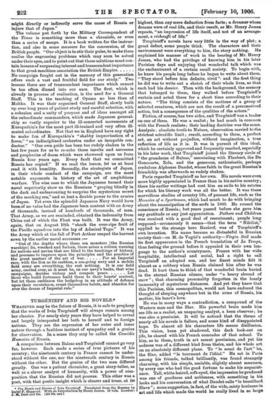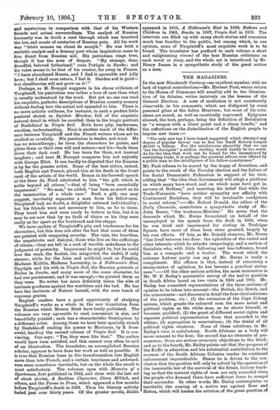TITRGPSIEFF AND HIS NOVELS.*
WHATEVER may be the future of Russia, it is safe to prophesy that the works of Iviln Turgenieff will always remain among her classics. For nearly sixty years they have helped to reveal and largely interpreted her both to herself and to foreign nations. They are the expression of her outer and inner nature through a faultless instinct of sympathy and a genius for observation. In a sense they may be called the Comedie Humaine of Russia.
A comparison between Balzac and Turgenieff cannot go very far, however. Each made a series of true pictures of his country ; the nineteenth century in France cannot be under- stood without the one, nor the nineteenth century in Russia without the other. But the genius of the two men differed greatly. One was a patient chronicler, a great story-teller, as well as a clever analyst of humanity, with a power of com- position that the Russian did not possess. This other was a poet, with that poetic insight which is clearer and truer, at its
• The Novels and Stories of ledit Turgenieff. Translated from the Russian by Isabel F. Hapgood. With an Introduction by Henry James. 16 vols. London Dent and Co. [44 16s. net.1
highest, than any mere deduction from facts ; a dreamer whose dreams were of real life, and their result, as Mr. Henry James repeats, "an impression of life itself, and not of an arrange- ment, a rgehauffe of life."
Turgenieff's novels have very little in the way of plot; a great defect, some people think. The characters and their environment were everything to him, the story nothing. He explained his manner of work in the hearing of Mr. Henry James, who had the privilege of knowing him in his later Parisian days and enjoying that wonderful talk which was the enchantment of a certain small society. To begin with, he knew his people long before he began to write about them. " They stood before him definite, vivid ": and the first thing he did was to write out a sketch of their whole lives, so that each had his dossier. Then with the background, the scenery that belonged to them, they walked before Turgenieff's curtain and acted there for a short time according to their nature. " The thing consists of the motions of a group of selected creatures, which are not the result of a preconceived action, but a consequence of the qualities of the actors."
Fiction, of course,ihas two sides, and Turgenieff was a leader on one of them. He was a realist ; he had much in common with the French realists ; their leading doctrine was the same. Analysis : absolute truth to Nature, observation carried to the strictest scientific limit ; result, according to them, a perfect art, an art without prejudice, without imagination, a true reflection of life as it is. It was in pursuit of this ideal, which he certainly approved and frequently reached, especially in his later work, that Turgenieff joined the literary circle of " the grandsons of Balzac," associating with Flaubert, the De Goncourts, Zola, and the generous, enthusiastic, perhaps credulous Alphonse Daudet, whose faith in the great Russian's friendship was afterwards so rudely shaken.
Paris regarded Turgenieff as her own. His novels were even more highly appreciated in France than in his native country; there his earlier writings had cost him an exile to his estates for which his literary work was all the better. It was these marvellous studies of country life, of peasant life, such as the Memoirs of a Sportsman, which had much to do with bringing about the emancipation of the serfs in 1860. He roused the conscience of Russia; but years passed before she gave him any gratitude or any just appreciation. Fathers and Children was received with a good deal of resentment; people long supposed—erroneously it seems—that the term "Nihilist," applied to the strange hero Bazirof, was of Turgenieff's own invention. His name became so distasteful in Russian society that—on M. de Vogiie's authority—Virgin Soil made its first appearance in the French translation of Le Temps, thus feeling the ground before it appealed in their own lan- guage to the author's countrymen. France with her wide hospitality, intellectual and social, had a right to call Turgenieff an adopted son, and her finest minds felt it• almost as a robbery when Russia claimed him after he was dead. It hurt them to think of that wonderful brain buried in the eternal Russian silence, under "a heavy shroud of snow " ; that charming personality forgotten in the lonely immensity of mysterious distances. And yet they knew that this Parisian, this cosmopolitan, would not have endured the thought of sleeping anywhere but in the arms of Russia, his mother, his heart's love.
He was in many ways a contradiction, a compound of the Western man and the Slay. His powerful brain made him see life as a realist, an unsparing analyst, a keen observer; he was also a pessimist. It will be noticed that the theme of nearly all his novels is failure, and some kind of disappointed hope. To almost all his characters life means disillusion. This vision, keen yet shadowed, this dark look-out on life, he shared with his French comrades of that school. To him, as to them, truth in art meant pessimism, and yet his sadness was of a different kind from theirs, and his whole art on an absolutely different plane. To " le souci de fart" he, the Slav, added " le tourment de l'ideal." He sat in Paris among his friends, talked brilliantly, was found strangely charming, with his simple, amiable, slightly absent manners, by every one who had the good fortune to make his acquaint- ance. Tall, white-haired, soft-eyed, the impression he produced was one of goodness and nobleness, with something in his looks and his conversation of what Daudet calls "le brouillard. Slave " ; some suggestion, in fact, of the wide, misty horizons in art and life which made the world he really lived in so large
oind mysterious in comparison with that of his Western friends and actual surroundings. The analyst of Russian humanity was in truth a reed through which was breathed the low, sad music of centuries of Russian pain. All his work was " triste comme un chant de moujik." He was both a realistic analyst and a dreamy poet whose inspiration came to him direct from Russian soil. His patriotism rings true, though it has the note of despair. "My strange, dear, dreadful, beloved fatherland," cries PotUgin in Smoke ; and his voice seems to be that of his creator, far away in France. " I have abandoned Russia, and I fluid it agreeable and jolly here ; but I shall soon return, I feel it. Garden soil is good— but cloudberries will not grow on it !"
Perhaps, as M. Bourget suggests in his clever criticism of Turgenieff, his patriotism was rather a love of race than what is usually understood by the word. But yet no one can read his exquisite, pathetic descriptions of Russian country scenery without feeling how the actual soil appealed to him. There is no more artistic coldness, for instance, in such a perfect little pastoral sketch as Byezhin Meadow, full of the exquisite natural detail in which he excelled, than in the tragic portrait of Nezhdenof in Virgin Soil. Both have pity, tenderness, emotion, understanding. Here is another mark of the differ- ence between Turgenieff and the French writers whose art he studied so carefully. His pessimism is tender, not cruel. He has no misanthropy ; he loves the characters he paints, and pities them as their own will and nature—not his—leads them down their dark road. He has tears for them, not ironical laughter ; and here M. Bourget compares him not unjustly with George Eliot. It can hardly be disputed that the Russian is by far the greater artist. Some of the best critics, indeed, both English and French, placed him at his death in the front rank of the artists of the world. Renan in his farewell speech at the Gare du Nord attributed to him " the gift which ie noble beyond all others,"—that of being " born essentially impersonal." " No man," he added, "has been as much as he the incarnation of a whole race." Such a gift, one may suggest, inevitably separates a man from his fellow-men. Turgenieff had, no doubt, a delightful outward individuality; but his friends were not necessary to him, as he to them. They loved him and were ready to believe in him, but it is easy to see now that by no fault of theirs or his they were really as far apart as the boulevard and the steppe.
We have spoken of Turgenieff's pity and tenderness for his characters, but this does not alter the fact that some of them are painted with unsparing severity. The vain, the heartless, the unpatriotic and disloyal, those who live on the sufferings of others,—they are left in a sort of terrible nakedness to the judgment of posterity. Impersonal he might be, but he could love the weak, the foolish, the misguided, the sinful, if only sincere; while for the false and artificial, such as PAnshin, Madame Kalitin, Madame Lavretzky, in A Nobleman's Nest, Sipyegin and his wife in Virgin Soil, the Russian generals at Baden in Smoke, and many more of the same character, he had one punishment, and it was enough,—he painted them as they were. No writer has more definitely taken the side of intrinsic goodness against the worthless and the bad. He has here the instincts of Nature herself, with the sure touch of supreme genius.
English readers have a good opportunity of studying Turgenieff's works as a whole in the new translation from the Russian which Messrs. Dent have lately published. The volumes are very agreeable to read, convenient in size, and
beautifully printed ; each has a characteristic frontispiece by a different artist. Among these we have been specially struck by Nezhdfinoff reading his poems to Marianna, by S. Ivan- owski, heading the second volume of Virgin Soil. It is con- vincing. One says : " Yes, they were like that." The author would have been satisfied, and this cannot very often be said of an illustration. The translator, an accomplished Russian scholar, appears to have done her work as well as possible. It is true that Russian loses in the transformation into English more than into French, and a certain heaviness and awkward- ness seem sometimes inevitable, but on the whole the result is most satisfactory. The volumes open with Memoirs of a Sportsman, first published in 1852, and close with the last set of short stories, A Reckless Character, Clara Militch, and others, and the Poems in Prose, which appeared a few months before Turgenieff's death in 1883. Thus his literary activity lasted just over thirty years. Of the greater novels, Ridin appeared in 1855, A Nobleman's Nest in 1858, Fathers and Children in 1861, Smoke in 1867, Virgin Soil in 1876. The intervals are filled up with many short stories and romances much less familiar to the public, but among which, in our opinion, some of Turgenieff's most exquisite work is to be found. The translator has prefixed to each volume a short and enlightening resume of the best Russian criticisms on each novel or story, and the whole set is introduced by Mr. Henry James in a sympathetic study of the great author as a man.











































 Previous page
Previous page